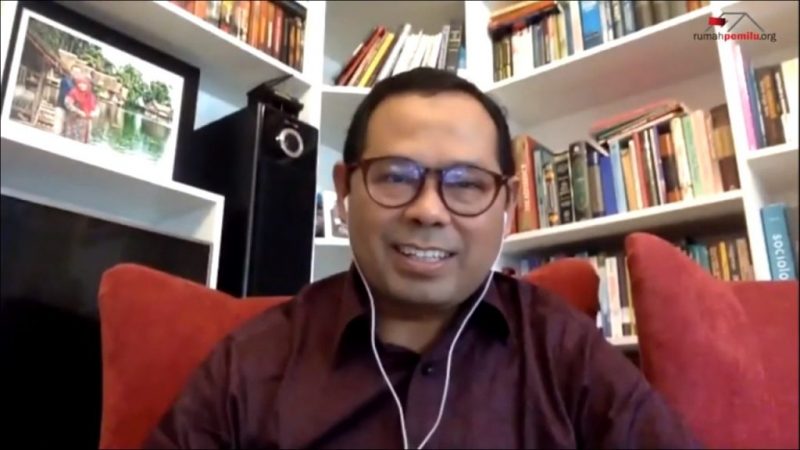Sunday, July 5, 2020, Center for The Study of Constitutional Law Faculty of Law Universitas Indonesia (PSHTN FHUI), Djokosoetono Research Center (DRC FHUI), Center for Constitutional Studies at the Andalas University Faculty of Law (PUSaKO FHUA), Rumah Kebangsaan, and Perludem held a Public Lecture of 50-year Prof. Topo Santoso, “Law Enforcement Design for Democratic and Equitable Elections” in commemoration of Prof. Topo Santoso, S.H., M.H., Ph.D. 50th birthday.
This public lecture was held to convey Prof.’s thoughts Topo Santoso regarding the discussion of the Election Bill that is currently underway. For example, related to the urgency of reviewing too many criminal articles and inconsistent regulation in the Election Law. As well as the need to organize the organizers of electoral institutions to strengthen law enforcement in Indonesian elections.
The Indonesian Constitution states that elections are held by a national, permanent and independent election commission. In practice, “an election commission” refers to three institutions — namely the Election Commission (KPU), the Election Supervisory Body (Bawaslu), and the Election Organizer Honorary Council (DKPP) —as a unified election management function. The Constitutional Court (MK) affirmed that in decision No. 11 / PUU-VIII / 2010.
After the decision, Bawaslu and DKPP became institutions that have properties and positions that are equal to the KPU. This gives legislators the flexibility to continue to tamper with the institutional design of the EMB and their respective authorities. As a result, these institutions often disagree and compete with one another to be the greatest in one matter: the holding of elections.
“Indonesia is the country with the highest number of institutions that administer elections,” said Topo Santoso, Professor of the Faculty of Law, University of Indonesia (FHUI), in a public lecture entitled “Paradox in Election Law Enforcement in Indonesia” to commemorate his 50th year (5/5 / 7).
Topo gave an example, the KPU was often preoccupied with a summons by Bawaslu when it was considered to violate administration, was summoned by DKPP when it was considered to violate ethics, or even was called by the police when it was considered to have committed a crime. The focus of the KPU in carrying out its main function of holding elections often must be disrupted by matters that require the KPU to maintain decisions and decisions in the holding of elections which are actually the KPU’s authority.
While Bawaslu is also considered to have no clear focus on the system

